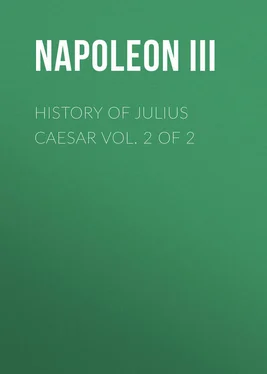Napoleon III - History of Julius Caesar Vol. 2 of 2
Здесь есть возможность читать онлайн «Napoleon III - History of Julius Caesar Vol. 2 of 2» — ознакомительный отрывок электронной книги совершенно бесплатно, а после прочтения отрывка купить полную версию. В некоторых случаях можно слушать аудио, скачать через торрент в формате fb2 и присутствует краткое содержание. Жанр: foreign_antique, foreign_prose, Биографии и Мемуары, на английском языке. Описание произведения, (предисловие) а так же отзывы посетителей доступны на портале библиотеки ЛибКат.
- Название:History of Julius Caesar Vol. 2 of 2
- Автор:
- Жанр:
- Год:неизвестен
- ISBN:нет данных
- Рейтинг книги:4 / 5. Голосов: 1
-
Избранное:Добавить в избранное
- Отзывы:
-
Ваша оценка:
- 80
- 1
- 2
- 3
- 4
- 5
History of Julius Caesar Vol. 2 of 2: краткое содержание, описание и аннотация
Предлагаем к чтению аннотацию, описание, краткое содержание или предисловие (зависит от того, что написал сам автор книги «History of Julius Caesar Vol. 2 of 2»). Если вы не нашли необходимую информацию о книге — напишите в комментариях, мы постараемся отыскать её.
History of Julius Caesar Vol. 2 of 2 — читать онлайн ознакомительный отрывок
Ниже представлен текст книги, разбитый по страницам. Система сохранения места последней прочитанной страницы, позволяет с удобством читать онлайн бесплатно книгу «History of Julius Caesar Vol. 2 of 2», без необходимости каждый раз заново искать на чём Вы остановились. Поставьте закладку, и сможете в любой момент перейти на страницу, на которой закончили чтение.
Интервал:
Закладка:
Emperor of the French Napoleon III
History of Julius Caesar Vol. 2 of 2
PUBLISHER’S NOTE
IT is, perhaps, not without interest, in publishing the second volume of the History of Julius Cæsar, written by the Emperor Napoleon III., to call to memory the names of Sovereigns and Princes who have employed themselves upon the same subject.
The King of France, Charles VIII. , showed an especial admiration for the Commentaries of Cæsar, and the celebrated monk, Robert Gaguin, presented to him, in 1480, the translation he had made in French of the eight books of the War in Gaul. We are informed of this in the edition of the translation by the learned monk, printed in 1500. This edition, in large 4to, is from the press of Antoine Verard. (See J. Ch. Brunet, Manuel du Libraire et de l’Amateur de Livres , fourth edition, tom. I., p. 518, and the Biographie Universelle , article Charles VIII. )
Charles V. , who professed a great admiration for Cæsar, left a copy of the Commentaries filled with marginal notes, written with his own hand. It was at his instigation that the Viceroy of Sicily, Ferdinand Gonzaga, sent a scientific mission into France to study Cæsar’s campaigns on the localities. The forty plans which were made by the members of this commission, and among which that of Alise is found, were published in 1575, in the edition of James Strada.
The Sultan Soliman II. , contemporary of Charles V., whom he had taken for his model, sent through all Europe to procure as many copies of Cæsar’s Commentaries as could be found, which he ordered to be collated, and caused a translation to be made into the Turkish language for his own daily reading.
The King of France, Henri IV. , translated the two first books of Cæsar’s Commentaries . The manuscript of this translation was deposited in the Bibliothèque du Roi, and M. des Noyers took it thence to deliver it to Louis XIII., who, in his turn, translated the two last books of the Commentaries . These two translations were joined together, and printed at the Louvre in 1630.
Louis XIV. translated the first book of the Commentaries . His translation was printed at Paris in 1651, in folio, with figures. This work has not been reprinted; it is now very rare. The reader may consult on this subject the Méthode d’étudier l’Histoire of the Abbé Lenglet-Dufresnoy, tom. II., p. 481; and J. Ch. Brunet, Manuel du Libraire et de l’Amateur de Livres , fourth edition, tom. I., p. 519.
The great Condé , who had studied with care the campaigns of Cæsar, encouraged the translation of the Commentaries undertaken by Nicolas Perrot d’Ablancourt; it was the translation most esteemed and the most in vogue during the last century.
Christina, Queen of Sweden , had composed Reflections on the Life and Actions of Cæsar , as we are informed by J. Arckenholz in his work entitled Mémoires concernant Christine, Reine de Suède , Amsterdam, 1751-1760, tom. IV., No. 6, p. 4.
Louis Philippe Joseph d’Orléans , surnamed Egalité , was a great reader of the Commentaries . He caused a map of Cæsar’s campaigns in Gaul to be made.
Lastly, the Emperor Napoleon I. , at St. Helena, dictated a Précis des Guerres de César to Comte Marchand, who published it in Paris in 1836, in 8vo.
BOOK III.
THE WARS IN GAUL, AFTER THE “COMMENTARIES.”
CHAPTER I.
POLITICAL CAUSES OF THE GALLIC WAR
Enterprising Character of the Gauls.
I. THERE are peoples whose existence in the past only reveals itself by certain brilliant apparitions, unequivocal proofs of an energy which had been previously unknown. During the interval their history is involved in obscurity, and they resemble those long-silent volcanoes, which we should take to be extinct but for the eruptions which, at periods far apart, occur and expose to view the fire which smoulders in their bosom. Such had been the Gauls.
The accounts of their ancient expeditions bear witness to an organisation already powerful, and to an ardent spirit of enterprise. Not to speak of migrations which date back perhaps nine or ten centuries before our era, we see, at the moment when Rome was beginning to aim at greatness, the Celts spreading themselves beyond their frontiers. In the time of Tarquin the Elder (Years of Rome, 138 to 176), two expeditions started from Celtic Gaul: one proceeded across the Rhine and Southern Germany, to descend upon Illyria and Pannonia (now Western Hungary ); the other, scaling the Alps, established itself in Italy, in the country lying between those mountains and the Po. 1 1 Justin, XXIV. 4. – Titus Livius, V. 48.
The invaders soon transferred themselves to the right bank of that river, and nearly the whole of the territory comprised between the Alps and the Apennines took the name of Cisalpine Gaul . More than two centuries afterwards, the descendants of those Gauls marched upon Rome, and burnt it all but the Capitol. 2 2 Polybius, II. 17-19. – Titus Livius, V. 35.
Still a century later (475), we see new bands issuing from Gaul, reaching Thrace by the valley of the Danube, 3 3 Pausanias, X. 19-23. – Diodorus Siculus, Eclog. , XXII. 13.
ravaging Northern Greece, and bringing back to Toulouse the gold plundered from the Temple of Delphi. 4 4 Strabo, IV. p. 156, edit. Dübner and Müller. – Justin, XXXII. 3.
Others, arriving at Byzantium, 5 5 Polybius, IV. 46.
pass into Asia, establish their dominion over the whole region on this side Mount Taurus, since called Gallo-Græcia , or Galatia , and maintain in it a sort of military feudalism until the time of the war of Antiochus. 6 6 Justin, XXV. 2. – Titus Livius, XXXVIII. 16. – Pausanias, VII. 6, § 5.
These facts, obscure as they may be in history, prove the spirit of adventure and the warlike genius of the Gaulish race, which thus, in fact, inspired a general terror. During nearly two centuries, from 364 to 531, Rome struggled against the Cisalpine Gauls, and more than once the defeat of her armies placed her existence in danger. It was, as it were, foot by foot that the Romans effected the conquest of Northern Italy, strengthening it as they proceeded by the establishment of colonies.
Let us here give a recapitulation of the principal wars against the Gauls, Cisalpine and Transalpine, ich have already been spoken of in the first volume of the present work. In 531 the Romans took the offensive, crossed the Po, and subjugated a great part of the Cisalpine. But hardly had the north of Italy been placed under the supremacy of the Republic, when Hannibal’s invasion (536) caused anew an insurrection of the inhabitants of those countries, who helped to increase the numbers of his army; and even when that great captain was obliged to quit Italy, they continued to defend their independence during thirty-four years. The struggle, renewed in 554, ended only in 588, for we will not take into account the partial insurrections which followed. During this time, Rome had not only to combat the Cisalpines, assisted by the Gauls from beyond the Alps, but also to make war upon the men of their race in Asia (565) and in Illyria. In this last-mentioned province the colony of Aquileia was founded (571), and several wild tribes of Liguria, who held the defiles of the Alps, were subjugated (588).
Wars of the Romans beyond the Alps.
II. In 600, the Romans, called to the assistance of the Greek town of Marseilles, which was attacked by the Oxybii and the Deciates, Ligurian tribes of the Maritime Alps, 7 7 Polybius, XXXIII. 7, 8. – Titus Livius, Epitome , XLVII.
for the first time carried their arms to the other side of the Alps. They followed the course of the Corniche, and crossed the Var; but it took, according to Strabo, a struggle of eighty years before they obtained from the Ligures an extent of twelve stadia (2·22 kils.), a narrow passage on the coast of the sea, to enable them to pass through Gaul into Spain. 8 8 Strabo, IV., p. 169.
Nevertheless, the legions pushed their encroachments between the Rhone and the Alps. The conquered territory was given to the people of Marseilles, who soon, attacked again by the peoples of the Maritime Alps, implored a second time the support of Rome. In 629, the Consul M. Fulvius Flaccus was sent against the Salluvii; and, three years afterwards, 9 9 Titus Livius, Epitome , LX.
the proconsul C. Sextius Calvinus drove them back far from the sea-coast, and founded the town of Aix ( Aquæ Sextiæ ). 10 10 Titus Livius, Epitome , LXI.
Интервал:
Закладка:
Похожие книги на «History of Julius Caesar Vol. 2 of 2»
Представляем Вашему вниманию похожие книги на «History of Julius Caesar Vol. 2 of 2» списком для выбора. Мы отобрали схожую по названию и смыслу литературу в надежде предоставить читателям больше вариантов отыскать новые, интересные, ещё непрочитанные произведения.
Обсуждение, отзывы о книге «History of Julius Caesar Vol. 2 of 2» и просто собственные мнения читателей. Оставьте ваши комментарии, напишите, что Вы думаете о произведении, его смысле или главных героях. Укажите что конкретно понравилось, а что нет, и почему Вы так считаете.












